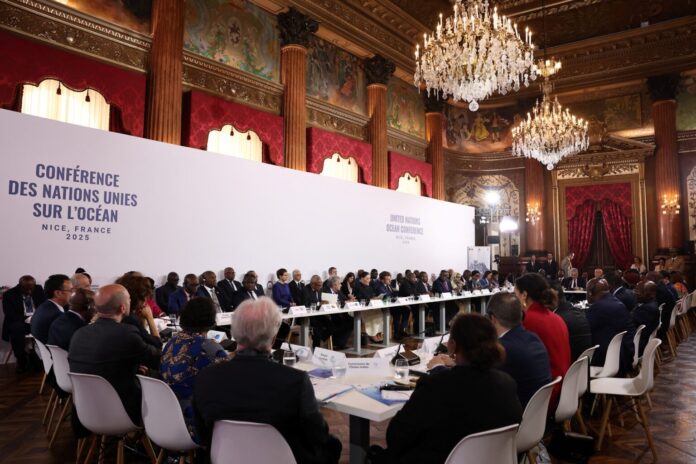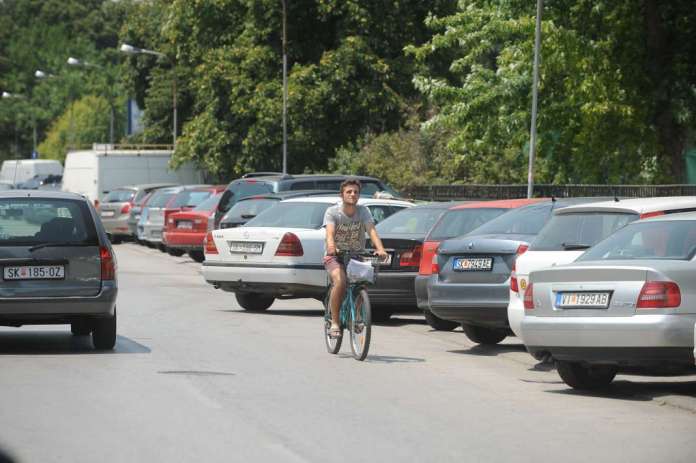Oceans suffer, the international community will try to organize to save them

United Nations Third Conference on Oceans (OND) in Nice, France
Global warming, acidic atmospheric sludge and increase in ocean waters, excessive fishing, pollution…, the marine environment suffers from a large number of evils. From June 9th to June 13, about sixty Southern States, including the President of Macedonia, meet to try to prevent the degradation of this giant ecosystem necessary for life on Earth
Toni Glamcevski,
Our permanent correspondent from France
Nice on the Cote d’Azur, the 56 heads of state or government, from June 9th to 13th, on the occasion of the third United Nations Conference on Oceans (OND), will they have to find a way to better protect the fluid heart on the blue planet?
« It’s a combat summit, with countries that believe that they want to get involved, a summit that allows island countries to voice and which includes scientists, » resumes Olivier Poari D’Arvor, Emmanuel Macron’s special envoy for this conference.
« Ocean without rules is a planet without a future, » he says.
The third United Nations Conference on Oceans begins with the conclusion: the ocean suffers! It is affected by global warming, which acidifies the seas and disrupts ecosystems. Its biodiversity is degraded by land pollution, with plastic, antibiotics and phytosanitary products always ending up in the ocean. It is under pressure from fishing, both legal and illegal. It is also threatened by the ambitions of the great powers, who want to continue to exploit the seabed smoothly. Gathered from June 3 to June 6 at the « Ocean » Congress, scientists around the world have once again warned states.
– ecosystems do not work properly; We see populations either exploding or disappearing at once – notes in Parisian Le Monde Didier Gaskel, a marine -biology specialist.
« All indicators are getting worse, » Marina Levi, an ocean adviser to the president of the French Institute for Research and Development, said.
This situation is especially dangerous for coastal populations, but also a challenge for all humanity. The sea, as a carbon absorber, which absorbs 25 percent to 30 percent of the CO2 that emits human activities, plays « a central role in climate regulation, » Recalled Antoine Petit, President and CEO of CNRS (National Center for Scientific Tests). Fish, shells and crabs, in turn, provide « the existence of more than three billion people ». Matched with cargo ships, the oceans are transit roads by 80 percent of world goods. Only the maritime economy is the equivalent of the fifth largest economy in the world, the Organization for Economic Co -operation and Development (OECD) said in a report released earlier this year.
French diplomacy is thrilled by the mobilization of the International Community in connection with
Like all major summits of climate and environmental diplomacy, Undo should be a crucial and new milestone. While only 24 head of states attended the second edition of the 2022 Oceans Conference in Lisbon, French diplomacy is thrilled by the mobilization of the international community. 12,000 delegates have been registered, and 2,300 scientists will be present in Nice.
« Such a level of political participation at the highest level has never been achieved on this issue, » the Elysee Palace said.
In Nice on the END, the first challenge for diplomats will be to ask the issue in the foreground in the world torn by geopolitical tensions and two major crises, in Ukraine and Gaza. Important countries are represented. Chinese Vice President Jan Feng is expected to attend a 150 -member delegation. Brazilian President Lula will also attend a few months before the 30th conference on the climate sides (KOS30) in Belem. But complains about the absence of the United States. Until the last moment, French diplomacy was trying to bring an American delegation.
« I regret that some heads of state decide to ignore science and even annul scientific studies and warnings to find an excuse not to act, » Minister of Environmental Transition Agnes Panieri-Runascher complained during a visit to Nice before the start of the conference. Nice is the first important test for the new US administration and what position will be the US president, who has withdrawn from the Paris Agreement on Climate Change.
Emmanuel Macron is expected to send messages to the world from Nice. During the « SOS Ocean » event, organized in March as a preamble to the Nice Summit, as French media recall, he implicitly criticized Donald Trump and Ilon Musk, reiterating that there is no « planet B » and that we must preserve the country instead of striving for Mars. The French president, whom the Elysee Palace describes as « the leader of the oceans who every time he sees a human being asks: » How will you deal with your ocean? « Hopes to unite groups of countries over the conservation and sustainable use of marine biodiversity in international waters (biodiversity) or the Biodi
– There is a convergent vision (…) among many countries for joint management of these problems and building coalitions for adaptation and climate data data. These are questions that are being considered in the END and will be discussed in Belem – they officially said at the Elysee Palace.
Anno is very different from Cop (biodiversity conference)
For five days, the purpose of the delegations will not be a difficult contract.
« This is time to make an overview and try to speed up, » said Julien Rochett, director of the Ocean Program at the Institute of Sustainable Development and International Relations. For months, the French diplomatic network has been focused primarily on securing the sixty ratifications needed to take into force on the Burnj Treaty, better known in France as an open sea agreement. This text, which will particularly regulate the creation of marine protected areas in international waters, was adopted only two years ago after many years of negotiations. The Elysee Palace is pleased that « he returned it from dust in 2022 », in the words of Poarvor D’Arvor. It is very unlikely that 60 ratifications will be achieved during the summit, as Emanuel Macron hoped. But they are expected from 45 to 50. French diplomacy now hopes to reach this threshold by the end of the year, the first step towards organizing a Cop dedicated to the Open Sea.
A number of voluntary obligations are also expected, especially on the issue of marine protected areas in exclusive economic zones (EEC). At the Montreal Biodiversity Conference in Montreal in 2022, the international community set a goal of protecting 30 percent of the ocean by 2030. French officials hope that Nice’s announcement will increase this goal from about 8 percent to 12 or 13 percent.
« We have to focus on the quality of these marine protected areas, » notes Joachim Klode, an Ocean Advisor in CNRS, because they have many different levels of regulation, which are often considered insufficient. For months, in France, associations have been increasing their efforts and activities to ban the lower bottom fishing than all these areas where it is still allowed. On May 21, Greenpeace placed several limestone blocks at the bottom of the Bay Lyon Sea Park, located off the coast of and oriental Pyrenees, « to prevent fishing until the bottom there. » This action was convicted by the Ministry of Environmental Transition. The NGO ship was forbidden and approximated to the port of Nice. Fishermen, for their part, were afraid of banning fishing to the bottom and its consequences.
Explicit protection on the sea (ocean) bottom!
After Emanuel Macron’s first speech in the regional press on Saturday night, and then to the Minister of Environmental Transition in the French media on Sunday, June 8, it was set aside that fishing to the bottom, as well as « all human activities with a significant impact on the seabed », would be banned in certain areas, which will be banned in certain areas today. This promise was rated as disappointing by several spokesmen of environmental organizations. They will examine the remaining announcements.
« We need specific promises, » Franco-Canadian biologist Daniel Polly insisted. NGOs and researchers are concerned about the lack of monitoring after the summit.
« We can commit to what we want, but there is no responsibility behind it, » Klode warns, which is worried that « we will continue to promise what we have not fulfilled from the previous conference. »
Another sensitive issue is the protection of the deep seabed. At the end of April, the US president signed an executive order that accelerated research permits and commercial exploitation in international waters, violating any multilateralism. The regulation of these areas, which does not belong to any country, is the responsibility of the International Seafood (ISA), organization based in Jamaica, where states prepare the contours of the future mining code. The next negotiations in Isa will begin in less than a month, July 7. In Nice, the new states could decide to join the coalition of about thirty countries, which advocate a moratorium on seabed exploitation, « cautious break » or even a ban – the French position of 2022. Agnes Panieri-Runaser also wrote to his European counterparts « to mobilize them on this issue », in line with the head of state, who intends to use the « to re-mobilize the international community ».
The draft political declaration of the summit has already been rated too weak by environmental organizations.
« What we consider to be insufficient is especially the seabed mining, because we would like to include some sort of caution, » claims Megan Rands, a head of the Greenpeace delegation. Another example: States are urging to « consider signing and ratifying the Open Sea Treaty, a formulation that Pierre Kanette, director of public policy at the Clienert organization, considers it shy. Researchers also express some regret.
« There is a lot of information on the environmental state of the ocean, the economy, but nothing about the social dimension, » Klode complains to reporters.
Although diplomatic negotiations and state announcements still look fragile, several scientific projects are well on its way. Thus, Nice serves as a starting point for the International Ocean Sustainability Platform (IPOS), designed to support states’ decision -making. For example, it could enable the transmission of « solutions based on the state of knowledge, » explains François Gay, who is the initiative. Another project: the « starfish » barometer, discovered on June 8.
« This is the first global bulletin for the health of the oceans, which will provide one year review to another, » said oceanographer Marina Levi, who is the first edition codiror. These initiatives, once again, will provide insights to the heads of state during the open sea Cop1, which could take place at the end of 2026.
The Nice conference is expected to be a place of discussion on other forthcoming projects, especially for the future agreement aimed at ending plastic pollution. Negotiating session for this text is scheduled for August in Geneva. T.G
Macedonia is a continental country, but its water treasures are endangered
Macedonia does not go out to the sea/ocean, but its waters flows into the surrounding seas. We may not yet understand the meaning of our waters, do not treat them appropriately, economically and with deep respect to preserve both surface and underground, exposed to excessive exploitation and pollution … This is happening at the moment when one of our pearls, Prespa Lake, is empty, Irrigation… T.G








